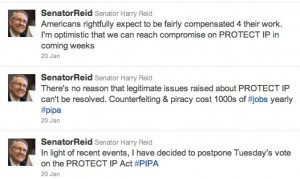Networking sites react to anti-piracy legislation
Sara Haghipour
The Signal
For one day the world turned black, the world of Wikipedia that is. For 24 hours, the online collaborative encyclopedia that most students turn to as their first step in research shut down its site in protest of the Stop Online Piracy Act (SOPA) and the Protect IP Act (PIPA).
The public outpour in protest of the two bills that were written with the intent of protecting intellectual property was so great that both bills have been tabled, at least temporarily.

Wikipedia’s blackout was just one online protest that took place Jan. 18. More than 7,000 sites in all publicly denounced SOPA and PIPA, including Google who managed to get more than 3 million people to sign a petition in objection. Opponents of these bills used social media sites such as Facebook and Twitter to share information on how to protest and sign petitions.
“Social media really helped spread the word about the issues and why they were important,” stated Rebecca Jeschke, media relations director and digital rights analyst at the Electronic Frontier Foundation. “Since social media users are a tech savvy bunch already, they immediately understand what’s at stake.”
Rep. Lamar Smith, R-CA, is the chief sponsor of SOPA, which was introduced in October 2011. Smith has since agreed to review the wording of the bill because of the public outcry.
“I have heard from the critics and I take seriously their concerns regarding proposed legislation to address the problem of online piracy,” Smith said in a press release from the House Judiciary Committee. “It is clear that we need to revisit the approach on how best to address the problem of foreign thieves that steal and sell American inventions and products.”
Congress plans to revisit the SOPA bill in February for review and modification.
The Senate was scheduled to vote on the PIPA bill Jan. 24, but Senate Majority Leader Harry Reid, D-NV, postponed the vote.

“There’s no reason that legitimate issues raised about PROTECT IP can’t be resolved,” Reid tweeted.
There has not been an official new date set for the vote.
The goal of these bills is to stop online piracy from costing the U.S. economy more than $100 billion annually.
H.R. 3261 – Stop Online Piracy Act states “A service provider shall take technically feasible and reasonable measures designed to prevent access by its subscribers located within the United States to the foreign infringing site (or portion thereof) that is subject to the order, including measures designed to prevent the domain name of the foreign infringing site (or portion thereof) from resolving to that domain name’s Internet Protocol address.”
Senator Patrick Leahy, D-VT, introduced PIPA May 12, 2011. PIPA is geared more toward taking down rogue websites in foreign countries that are stealing American intellectual property and copyright material.
S.B. No. 968 Protect IP Act states, “The Attorney General may commence an in personam action against a registrant of nondomestic domain name used by an Internet site dedicated to infringing activities.”
Supporters of the bills include the Recording Industry Association of America, Motion Picture Association of America, and the Copyright Alliance.
Opposers of the bills include Wikipedia, Google, Facebook, Mozilla, Yahoo, Twitter, AOL, LinkedIn, and EBay. Also included in this group is Vint Cerf, one of the founding fathers of the Internet.
In an open letter to Smith, Cerf wrote, “This collateral damage of SOPA would be particularly regrettable because site blocking or redirection mechanisms are unlikely to make a significant dent in the availability of infringing material and counterfeits online.”
In a follow-up interview with The Signal, Cerf offered another solution regarding ways to attack online piracy.
“The more serious problem is that there are many ways to defeat a unilateral attempt to filter discovery of and access to infringing websites,” Cerf said. “This does not mean that nothing should be done. There may be better technical tools, improved forensic capabilities and, in particular, the ‘follow the money’ approach to deny financial benefits to infringers.”
Cerf is not alone in suggesting the “follow the money” approach. Google spokeswoman Samantha Smith said Google also supported the “follow the money” approach.
“We support ‘follow the money’ legislation that would require ad networks, like ours, to cut off ads to sites dedicated to piracy or counterfeiting,” Smith said.
This approach goes after those who make money on these sites that allow piracy rather than the domain that holds the site. Rep. Darrell Issa, R-CA, has been working on the Open Act which is a bill following this approach.
Ashley Packard, professor of communication and digital media studies, and author of “The Borders of Free Expression,” said she is also in opposition of SOPA, although she points out that many have had a ‘sky-is-falling’ reaction because people are commenting on it without reading it.
“It was a poorly written bill that had the potential to interfere with protected speech and unfairly extend U.S. jurisdiction over foreign sites,” Packard said. “I’m glad that it has been tabled.”
In addition to SOPA and PIPA, there is another anti-piracy agreement making its way through the international community including America, the Anti-Counterfeiting Trade Agreement (ACTA).
It’s an international agreement that has already been signed by Japan, Korea, New Zealand, Morocco, Singapore, Canada and Australia. President Obama, representing the U.S., signed the agreement Oct. 11. The European Union, Mexico and Switzerland are still in negotiations regarding ACTA.
“The Anti-Counterfeiting Trade Agreement is a groundbreaking initiative by key trading partners to strengthen the international legal framework for effectively combating global proliferation of commercial-scale counterfeiting and piracy,” the Office of the United States Trade Representatives posted on its website.
Although the American public has been slow to learn about the treaty’s existence, ACTA already has many protesters, including the EFF.
“Both civil society and developing countries are intentionally being excluded from these negotiations,” EFF states on its website.


[…] • Networking sites react to anti-piracy legislation […]
[…] Networking sites react to anti-piracy legislation […]
[…] Congress plans to revisit the SOPA bill in February for review and modification………………………………..TO READ MORE CLICK HERE………………………………. […]